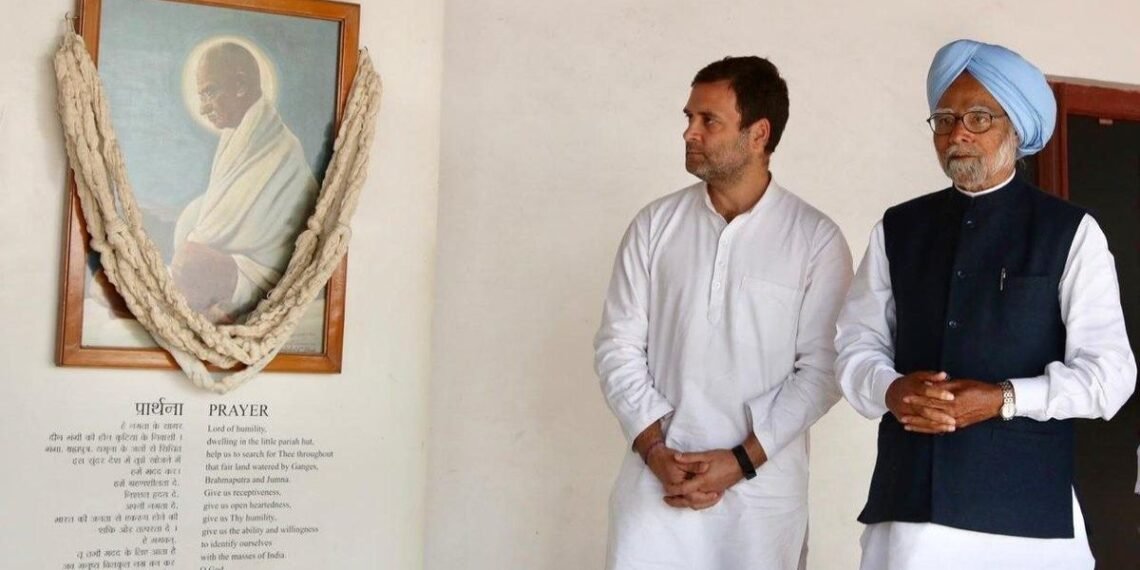In a bid to groom young leadership, Prime Minister Manmohan Singh repeatedly invited Rahul Gandhi to join his cabinet, citing his qualifications and potential. Yet, Rahul Gandhi stood firm, emphasizing his dedication to rebuilding the Congress Party’s structure and connecting with grassroots India. His decision reflects a strategic approach to leadership, prioritizing long-term organizational reform over immediate power.
By Navin Upadhyay
During his tenure as Prime Minister of India from 2004 to 2014, Dr. Manmohan Singh extended multiple invitations to Rahul Gandhi to join his cabinet. Dr Singh believed that involving Rahul in governance would not only strengthen the Congress Party’s presence in the executive but also project a fresh, youthful face of leadership in Indian politics.
Manmohan Singh Ji led India with immense wisdom and integrity. His humility and deep understanding of economics inspired the nation.
My heartfelt condolences to Mrs. Kaur and the family.
I have lost a mentor and guide. Millions of us who admired him will remember him with the… pic.twitter.com/bYT5o1ZN2R
— Rahul Gandhi (@RahulGandhi) December 26, 2024
In March 2009, ahead of the general elections, Manmohan Singh publicly revealed that he had offered Rahul Gandhi a ministerial position in his cabinet. Singh expressed admiration for Gandhi’s potential and believed that his active participation in governance would benefit the nation. He said, “I always wanted Rahul Gandhi to be a minister, but he refused.” Singh also highlighted the need for a generational shift in politics and his desire to nurture young leaders.
Rahul Gandhi, however, politely declined the offer, stating his preference for working at the grassroots level. He explained that his primary focus was on rebuilding the Congress party’s organizational structure and connecting with the youth. “I want to bring more youth into politics and make it more participatory,” Rahul remarked. He emphasized that his work with the Indian Youth Congress and the National Students’ Union of India (NSUI) was a priority and would help lay a strong foundation for the party’s future.
The 2009 General Elections and Renewed Invitation
After the Congress-led UPA secured a decisive victory in the 2009 general elections, Singh once again extended an invitation to Gandhi to join the cabinet. This time, the stakes were higher, as the Congress sought to consolidate its mandate and project a unified leadership. However, Gandhi remained steadfast in his decision. He believed that his role was better suited to organizational work rather than executive responsibilities.
Explaining his refusal, Rahul Gandhi said, “The Congress Party needs to reconnect with the grassroots. I want to spend my time rebuilding the organization and ensuring that our vision aligns with the aspirations of the common people. Governance is important, but at this stage, my role is outside the government.”
The 2010 Offer and Continued Reluctance
In May 2010, Prime Minister Singh reiterated his desire to bring Rahul Gandhi into the government, acknowledging his qualifications and the energy he could bring to the cabinet. Singh stated, “He has always been reluctant to give a positive answer, telling me that he has responsibilities within the party to strengthen its structure and connect with the youth.”
Rahul Gandhi’s refusal was consistent with his belief that the Congress Party needed to address systemic issues within its organization. He focused on democratizing the party by introducing internal elections in the Indian Youth Congress and NSUI, a move aimed at fostering meritocracy and reducing the influence of entrenched power dynamics. He saw his work as a long-term investment in the party’s future.
Rahul Gandhi’s Perspective on Leadership
Rahul Gandhi’s decision to decline a cabinet berth was rooted in his broader vision for leadership. He believed that engaging with people at the grassroots level and addressing their concerns directly would yield more sustainable results for the Congress Party. He also emphasized the need for young leaders to understand the realities of the people they represented, rather than being confined to administrative roles early in their careers.
In an interview, Gandhi remarked, “Real change comes from understanding the people you serve. My work in the party allows me to stay connected with the aspirations of the youth and the marginalized. Joining the cabinet would have distanced me from this crucial work.”
Legacy of the Decision
Rahul Gandhi’s decision to focus on party-building over governance reflected his unique approach to leadership during a critical phase of Indian politics. While some viewed his refusal as a missed opportunity to gain administrative experience, others saw it as a testament to his commitment to internal reform within the Congress Party. His strategy of prioritizing the organization over executive power continues to be a point of discussion in the narrative of his political career.
Ultimately, this choice underscored the complexities of leadership in a party navigating the challenges of governance, electoral competition, and internal revitalization.














